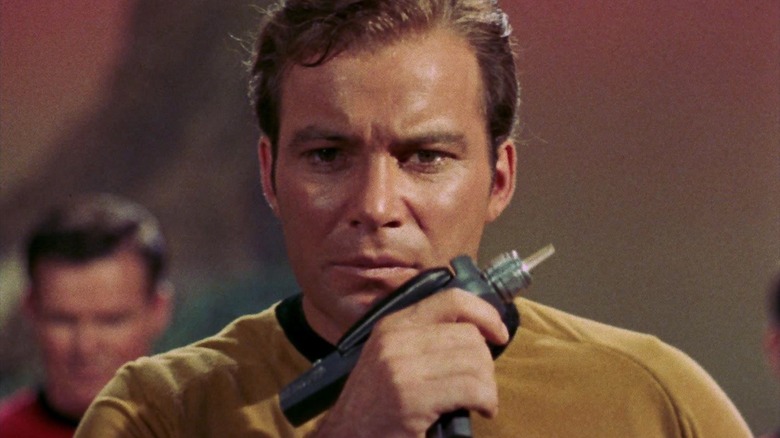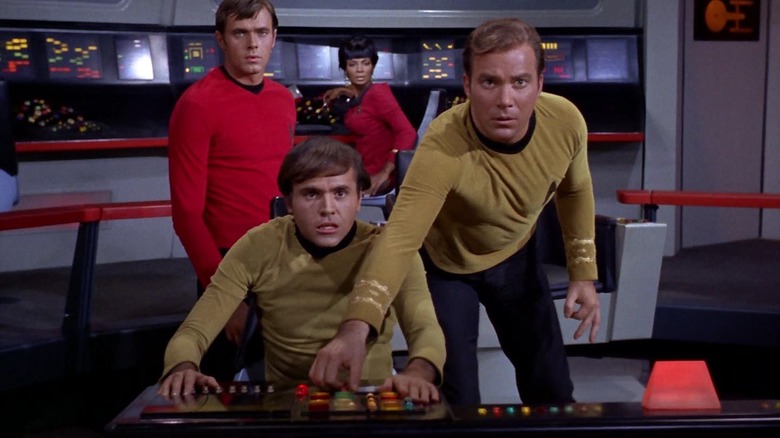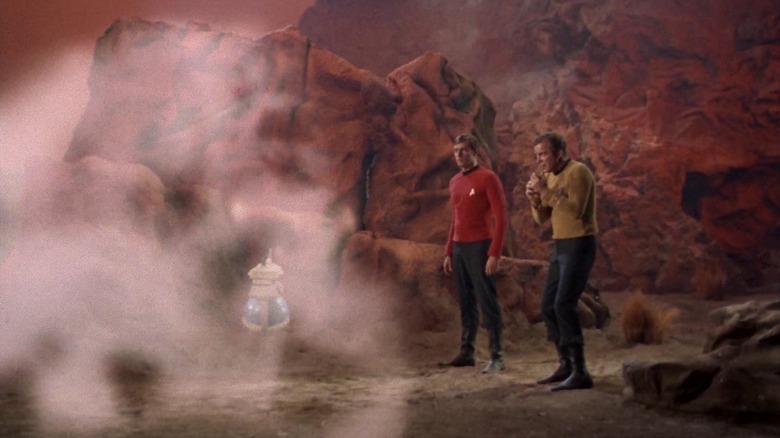One Underrated Star Trek Episode Showed Us A Side Of Captain Kirk Never Seen Before
The "Star Trek: The Original Series" episode "Obsession" may be one of the most underrated episodes of the show. It's actually one of the stronger Captain Kirk episodes, allowing the character to confront some of his acknowledged personal weaknesses, and, in overcoming them, grow as a character.
Kirk (William Shatner) had flaws, of course, but he was often depicted on "Star Trek" as being in complete control of his faculties (most of the time), using his leadership instincts and willingness to take calculated risks to avail himself of any crisis. He could have a temper, but usually caught himself before doing anything rash. In pop culture, Kirk has a reputation for being something of a reckless cowboy who broke the Prime Directive on the regular (and he often did play a little fast-and-loose with Starfleet regulations), but revisiting old "Star Trek" episodes reveals that he was actually pretty stern and judicious. He even had a reputation for being a bookworm; Lieutenant Gary Mitchell (Gary Lockwood) described him as "a stack of books with legs" in the episode "Where No Man Has Gone Before."
"Obsession" was a little different. It's an episode where Kirk was allowed to lose his cool — and for personal reasons, no less. It's one of the only times on "Star Trek" that we see Kirk making outwardly bad command decisions, to the point of being criticized by his crew. "Obsession" shows that Kirk is still suffused with guilt over a previous perceived failure from years earlier, and that he is still vulnerable to unsavory impulses. "Obsession" shows an ordinarily stern and capable character cracking under the pressure, but in a way that we, the viewers, can relate to. The episode makes Kirk that much more human.
Obsession reveals Kirk's relatable, human weaknesses
"Obsession" starts on the planet Argus X, where Kirk and several Enterprise crew members are conducting a planetary survey. Unexpectedly, an eerie mist begins to seep from the rocks and seemingly attacks the Starfleet officers. Kirk orders the crew to fire their phasers, but one of them hesitates, allowing the cloud to get him. It will be explained that the cloud is actually an intelligent, living creature that feeds off the iron in human blood. The dikronium cloud being, because it is noncorporeal, is seemingly unstoppable.
Kirk knows exactly what it is. He reveals that when he was a lieutenant on board the U.S.S. Farragut, serving under Captain Garrovick, the same cloud-like monster attacked him and his fellow crewmates. Kirk saw the thing suck blood out of his compatriots and kill his captain. Kirk tried to fire his phaser, but fear got the better of him, and he hesitated. He finally scared the being off, but not before it had killed half of the Farragut's crew. Ever since, Kirk has carried a great deal of guilt with him, thinking that his cowardice cost lives. His encounter with the dikronium cloud being may be one of the reasons he's resolved to be so brave.
But now, that guilt is rearing its ugly head. The cloud being is back, and Kirk becomes obsessed with exterminating it. Uncharacteristically, he panics. He takes over control of the ship when Chekov (Walter Koenig) doesn't act quickly enough. Kirk is convinced that if he just fires phasers quickly enough, he can kill the cloud. Vitally, Kirk orders that the Enterprise stay in the area to exterminate the creature after he's been given an urgent mission to another planet to deliver an important antivirus. This is very, very unlike Kirk.
Letting go of guilt
Usually, when Kirk acts this far out of character, his crewmates begin to suspect that he has been supplanted by a doppelgänger (a surprisingly common occurrence on "Star Trek"). He orders survivors to their quarters, relieving them of duty when they fail to fire their weapons at a cloud.
The fact that the monster is a cloud is certainly symbolic. The guilt we carry around with us is wispy and ineffable. We cannot attack it, because it has no body. It merely floats around us like a mist. Although the cloud being isn't very exciting visually — it's not exactly a widely celebrated "Star Trek" monster — its nonphysical nature makes it a perfect metaphor for Kirk's emotional state. When we're wracked with guilt, our vision is clouded.
Kirk eventually learns, in his various attacks, that phasers actually have no effect on the cloud creature. Kirk needn't feel guilty about not firing fast enough during his previous encounter on the Farragut, as it wouldn't have done anything. He was powerless when facing the creature, and his actions have nothing to do with its feeding cycle. Indeed, the creature can pass through shields, infiltrate the airtight Enterprise, and continue its mayhem unabated.
Fortunately, Spock (Leonard Nimoy) is able to face the cloud, as his Vulcan blood has no iron in it. Kirk calls a relieved officer back to duty, and it seems that he is forgiven himself. The only way out was knowledge, and an acknowledgement that we can't always control the world around us. This is a healthy, helpful real-life lesson that viewers can take away with them.
Sadly, that's not a satisfying denouement to a sci-fi series with a monster in it, so the screenwriters also tacked on a more cathartic ending wherein Kirk and the son of his old captain, Ensign Garrovick (Stephen Brooks), blow the creature up with a special bomb. It's a brusque ending to an otherwise emotionally intelligent episode. Trekkies tend to overlook "Obsession," but it's actually vital to the development of Kirk as a character. Sometimes even the strongest characters have to face their demons.


